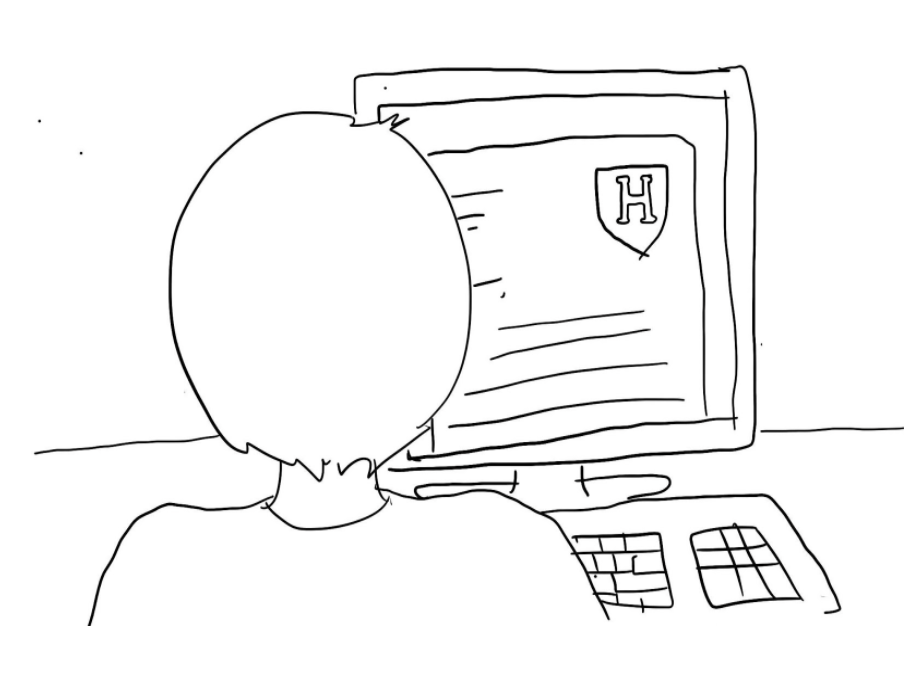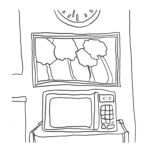
On December 11, 2003, I got into Harvard.
Maybe you’re impressed, maybe you’re groaning. Either reaction is fine with me. Harvard both is and is not the point of this story, so hang with me.
Harvard had not been my dream school. At least, not at first. I had my heart set on Brown. My mother’s family was originally from Rhode Island, and I thought Brown was a little more unique, as far as Ivy-League ambitions go. I didn’t want to totally embody the stereotype of the Long-Island-high-school-achiever, who would ache for Harvard. I thought I was more social, grounded, and balanced than that caricature.
But during spring break of my junior year, my father insisted that we see Harvard as part of our college trip. The junior year, spring break college trip was one of the few traditions my father enacted with his kids. Since he did not ask much of me in life, I obliged. Building the itinerary for the week, Dad had only a few requests: include small schools, include state schools, include Harvard. He thought I might get in, and that I would be crazy not to apply, given the possibility.
My father did not join me on the actual campus tours. That was his rule. He felt it important that my siblings and I experience campuses for ourselves. Dad did not want his own impressions to play any part in our decision-making. This policy reflected a strength in my father’s parenting. Dad took great interest in where his children went and the things his children did, but only after we went to those places and did those things for ourselves. Though he struggled to express it, Dad really did love each of us on our own terms.
So, Dad sat in the car, smoking, while I walked around Cambridge, following my surprisingly down-to-earth tour guide. We passed through green yards and walked by red brick buildings. The place was stoic and proud. It hummed with an intoxicating energy. (Later on, I would wonder if this was, in fact, the traffic on Mass Ave.) I was falling in love with Harvard, even though I really, really did not want to. Because loving Harvard was a stereotype that caused plenty of people to groan. Plus, I knew that Harvard would be a very, very tough dream to make come true.
But by the end of the tour, the damage was done. I bumped the Big H to the top of my reach list. A few months later, I decided to bite the bullet even harder. I applied early.
The wait was torturous, as it was for all of us. When my mind wasn’t busy with homework or friends, I played hours of Mario Tennis (excellent Nintendo 64 game, though I’m sure N64 is a legitimate dinosaur to your Switch / PS5 generation). I distracted myself with orange topspin forehands and blue slice backhands, trying not to think of all the reasons why I might or might not get into Harvard.
Then, on Thursday the 11th, 2003, I got my answer. Sitting at Amanda’s wooden dining table, minutes before we were due at play rehearsal, I got the email. I opened it, saw the word “delighted,” and cried. The feeling was so intense. It was made partly of joy, but mostly of relief. I would not have to know a disappointment that was truly terrifying to imagine. Instead, my years of working and wanting had ended as I had hoped they might. I had gotten in. To Harvard, nonetheless.
After the initial rush, I allowed for pride. I had done it! While the rich kids, like Daniel, had hired SAT tutors and flown themselves to fancy summer programs, I had rolled up my sleeves in our one-bedroom apartment and outworked them all. Later on, I would better understand the web of privileges that helped me to attain what I had. But on the 11th, in 2003, in the glow of that e-mail, I clung to the accomplishment as my own. I shared it only with my inner Achiever, who had run me ragged. Thank God he had! He had taken a wispy dream, which in so many moments felt beyond my reach, and he had made it real.
The hours that followed felt cinematic. Looking back, embarrassingly so; but at the time, I was too happy to be modest. Amanda and I skipped rehearsal. She drove me home to give mom a quick hug. Then, we headed to campus, where enough friends were lingering that I could enjoy more hugs and congratulations, prolonging the moment.
One of the first people I set out to tell was my sophomore and junior English teacher, Ms. Z. She had been a favorite. She was a no-frills kind of educator. No fancy PowerPoints or inventive extra credit opportunities. With Ms. Z, you read, you talked, you wrote. She didn’t need anything else: she loved words, she understood them, and she believed that we, too, could harness our own special relationship with language. My friends and I spent many lunch hours at her desk, reviewing drafts, discussing chapters, and trying to learn more about her approach to life, in the roundabout ways that teenagers do with the adults they admire.
I could only imagine how happy Ms. Z would be when I told her the big news. She was a fan of mine, as a student, writer, and person. She knew how hard I worked. She surely believed that no one deserved it more. Plus, she had invested her own time and energy in my application, writing my recommendation letter and helping to sharpen my personal statement.
Amanda and I and a few others found Ms. Z at her desk, marking papers. She looked up, startled, as we barreled through the office door. “I got in!” I shrieked.
She surveyed for a moment. She looked contemplative, maybe even hesitant.
“Andy, congratulations. That’s great news.”
Great news? This was far from the reaction I had expected. Ms. Z was the first person who didn’t play cinema with me. She did not wave arms, did not shout, did not throw out superlative adjectives.
Her reaction stood in contrast to all the others, and it surprised me. I felt confused and a little bit hurt. But I was too protective of the moment to hang around this kernel of disappointment. “Thank you for everything,” I said, and the crew and I carried on, back into the hallway, on the hunt for new, more appropriately enthused celebrants.
***
December retained a dreamy quality. I read my welcome materials again and again. I poked around on the Harvard website for hours, especially intrigued by the cornucopia of courses and clubs. I got a bunch of Harvard stuff for Christmas (true groan, I know). My father’s mother even knitted me a pillow with an incredible patchwork image of the campus. It was the first gift I had received from her in a few years, since I had forgotten to write her a thank you note back in eighth grade – a transgression she did not easily forgive.
After the holidays, when the high had (sort of) subsided, the memory of Ms. Z’s muted reaction began to haunt me. I was still annoyed by it, but increasingly, I was curious about it, too. Ultimately, Ms. Z was my favorite teacher. She was a person I really cared about and deeply respected. Her reaction, I decided, was not something to write off.
So, in early January, I ambled to the English office and began a familiar, impromptu lunchtime conference with Ms. Z. We talked about what we had read over break – for me, Ann Patchett’s Bel Canto, which I gave rave reviews.
Eventually, I brought up admission day:
“You seemed not so happy for me, about Harvard.”
I watched her face for a response. She knew what I meant.
“I was wondering why,” I said.
She took her time.
“Of course, I’m very happy for you, Andy. It’s wonderful, and you deserve it. But – “
She hesitated.
” – but, while I’m happy it went your way, and while I think you will do great things at Harvard, it was honestly a little scary to see how intense your own reaction was. To see how much getting into Harvard meant to you.”
I was already struggling. Of course it meant a lot to me!
She continued.
“I just want you to know that you would have been equally great, even if this hadn’t gone your way. Because you’re great. Regardless of what Harvard, or what any college, says.”
In a literal sense, I understood her. And at a literal level, I did not disagree. Yes, I would thrive at many colleges. Yes, Harvard wasn’t the be-all, end-all. But the feel of her insights seemed way off to me. And they were a total affront to my inner Achiever. Though logically true, her points seemed like rationalizations, the kind of feel-better comments a person would generate to face failure and survive disappointment. But I hadn’t failed, and I had escaped disappointment. So why temper victory with such sentiments, now?
I told Ms. Z that I understood, and I thanked her for clarifying. I appreciated that she was coming from a good place, though I could not grasp, at the time, her wisdom and her warning.
***
A few days later, the universe brought Ms. Z’s message back to me. It came in the form of a loving rant from Ms. P, my senior English teacher, who taught AP Literature. Ms. P was another favorite. She was friends with Ms. Z. They shared that distilled instructional style, rooted in their love of, and knack for, language.
I’m not sure what had happened that particular morning, but Ms. P lost it. Perhaps she had witnessed someone too overjoyed at their admission , like me; or maybe she had consoled someone too distraught at their rejection. Maybe she could feel our collective tension: the joys and sorrows and jealousies that we had for one another as the decisions came back. Whatever her inspiration, Ms. P opened class that day not with a fervent reading of Tess of the D’Urbervilles, but with some off-the-cuff candor:
“You know, what guys? I want to talk to you for a second about all this college stuff. I want to keep it real for a second.”
We looked up at her.
“I know, to you, these colleges, these decisions, seem like the most important thing in the whole world right now. But I promise you … these letters… these schools … they are not the most important thing. I promise you. Your life will have higher highs and lower lows than this.”
She let a beat pass, hoping we would hear her.
“Remember that.”
Another beat.
“Now, back to Tess and Sorrow.”
We flipped through our thick copies of Hardy, pens in hand, ready to underline examples of his rich imagery. But my mind was elsewhere. Ms. P’s words lingered.
Your life will have higher highs and lower lows than this.
Something about this sentence was very important. I could tell. It struck me as wise and a bit foreboding.
At the time, I did not probe its depth further. Maybe I could not understand. More likely, I did not want to. Instead, I tucked the sentence away, somewhere nearby Ms. Z’s muted reaction from the evening of December 11, 2003. The day I got into Harvard.
***
Months later, I would think of them, my English teachers, as I sat crying on my extra-long college twin bed.
I was at Harvard, a freshman now. The dream had become reality, ID card and all. It was shopping week, so named because we got to visit classes, to “shop” for our professors and their lectures, before we made any semester-long commitments.
The class I was most excited to shop was Anthropology 1600: Social Anthropology. I found it flipping through the enormous print copy of the 2004-2005 course catalog. Social Anthropology sounded fascinating. Study human culture, examine how different societies organize themselves and make meaning. Sign me up!
Anthropology 1600 was the first class I shopped, 10:00am Monday morning. I arrived early, grabbed a syllabus, and slid into a lefty desk. I began to read through the syllabus. The books looked interesting. The lecture titles sounded great. Then, I came across the paper topics. They were in bold, sprinkled throughout. They asked about the ethical and moral implications of the act of observation. They asked about the problems and opportunities of studying a “society.” They included terms like: cultural imperialism, ethnocentrism, historical particularism, and political ecology.
The essay prompts left me curious, but terrified. For all my years of good grades in a top-notch Long Island school district, I had no idea what any of this meant. I was not sure I could write these papers. The professor began his lecture. I hoped I would locate some confidence. Instead, I grew shakier. I left the lecture in knots.
Later that morning, I shopped Psychology 1, which had a single textbook and no heady paper topics. Just three midterms and a final, all multiple choice.
When I got back to my dorm room, I took out my course registration card, carried it to my extra-long college twin bed, and cried. I cried for lots of reasons. I cried because my books were too expensive. I cried because I missed home. But mostly, I cried because I was disappointed in myself: I wanted to take Psych 1. I wanted to do what felt safe, instead of wanting to do what felt right. I felt like I was starting all over again. Just a few years after losing Fat Andy, then building myself back up, then rediscovering my confidence and my humor and my joy, then learning to dance with abandon, then getting into Harvard, which was supposed to be the ultimate victory and validation, here I was again. Feeling that I was not enough. Intimidated by scary phrases on a syllabus. Afraid I might not get an A. Instead of trusting my curiosity and drive, I was retreating, like a coward, toward something safe, something I was more certain I could achieve.
So I sat on my extra-long twin bed, and I cried. I thought of Ms. Z and Ms. P and their earnest messages from months before. This cowardice: this was what they had feared for me and for my friends. They saw us wrapping our self-worth in Ivy, in all the wrong places. They knew the shakiness of such foundations. They feared we might not hold up.
I untucked Ms. P’s sentence. Your life will have higher highs and lower lows than this.
I understood. Put those papers, those phrases, into perspective. In life’s grand scheme, there are no real risks here. No real consequences. Take the class you want to take. Trust yourself.
I understood. I wanted to listen.
But I didn’t. There are so many ways of knowing. There are words that make sense from teachers you trust. But there are other forces and feelings, too. Achievement, approval, failure, rejection. Complicated companions that you meet in your therapist’s office at age fourteen, who, stubborn and savvy, hang around for years. Maybe forever.
I enrolled in Psych 1.
***
Should I have listened to my English teachers?
I think yes, I think no.
Their lesson was important. They offered it to me with wisdom and love. Had I learned their lesson right away, I would have navigated my freshman year differently. I would have taken Anthropology 1600 and taken more risks on top of that. I would have proceeded with more confidence and less fear, for that year, and in the years that followed.
As it were, I struggled to learn their lesson right away. I struggled to keep the highs and lows in perspective. I struggled to love myself as Fat Andy did, back when I was fourteen; to be all that I could be – a storyteller, an artist, an aspiring Freedom Rider, a confident dancer. Instead, I was grappling with achievement and approval, those formidable companions who kept hanging around.
In the years that followed, there were risks I took and risks I didn’t. There were moments of confidence and moments of doubt. There were steps forward, and steps backward, and stumbles to the side. But I did keep growing up, and upward, toward my fuller self.
When I look back at that boy, crying on his college bed, I feel less of a need to chastise him than I once did, for not taking Social Anthropology. I’m more forgiving of him; that he did not learn, right away, the very important lesson his favorite English teachers tried to teach him.
He just wasn’t ready. He wasn’t ready to learn it. I’ve made peace with that. I think, maybe, that is just the nature of his journey.
Some lessons find us at the right time. We are prepared for them. We let them in, and they take us and they shape us, and our learning happens, right there and then. Other lessons, I think, find us too early in life. We are not ready for them. But that is okay. Good lessons are patient. They wait. We tuck them away as memories, and later on, when we are ready, we look back. We find them. Rediscovered, they bloom anew. We study them. We learn.



